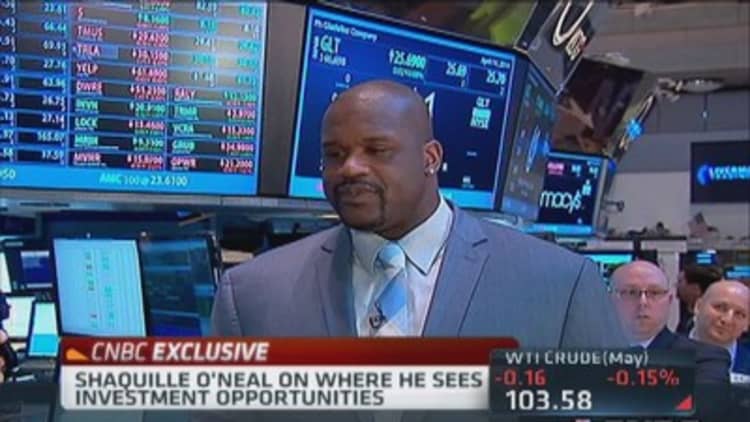If you're old enough to have wasted massive amounts of time playing Super Nintendo and Sega Genesis video games in the 1990s–– before Xbox and PlayStation became household names––you might have chanced upon Shaq-Fu. Widely considered to be one of the worst video games of all time, it is also the only game that can brag of a website devoted solely to the destruction of every copy.
Aside from its wildly uneven ratings, Shaq-Fu's original 1994 release drew attention for another notable fact: The game's creator and star was Shaquille O'Neal, at the time a new NBA sensation who would soon lead the Orlando Magic to the final game of the 1995 playoffs.
Flash-forward to 2014. Now retired from the NBA, where he ended his career as a 15-time All-Star, Shaq is back in the game industry with plans to unveil a sequel to his original, called Shaq Fu: A Legend Reborn.
Among the interesting facets of the relaunch is the frank sense of humor with which O'Neal now acknowledges the mediocrity of the original––the campaign for the sequel promises that "we won't FU it up this time"––as well as the unexpected way he has chosen to raise capital.
While crowdfunding has skyrocketed in popularity among the indie set as an innovative way to fund projects ranging from wearable technology and punk albums to food trucks plying pierogi, it has not, until recently, been the territory of Hollywood B-listers and NBA stars.
Launched the day before the kickoff of last month's South by Southwest Festival—where O'Neal gave a talk—his Indiegogo campaign had raised about $400,000 as of May 2, and looked like it was on pace to reach its $450,000 goal by the campaign's May 5 end date.
Read MoreShaq on the sports star who got him interested in business
Can the very nature of crowdfunding help create a velvet rope around the celebrity capitalist projects that deserve to get our cash? Indiegogo's head of gaming, John Vaskis, thinks the answer to that question is yes. As an example, Shaq used crowdfunding to get feedback on the game before it came out. The direct feedback one receives through crowdfunding essentially mitigates risks for investors, developers and potential venture capitalists, Vaskis said. "When you do go to market, you know what people actually want," he said.
From last-ditch to blockbuster hit
In the case of one of the biggest crowdfunding success stories to date, fans of the 2004–2007 TV series "Veronica Mars" had a pretty good idea what they might be getting when they reached into their pockets to fund a feature film that also stars Kristin Bell as the eponymous young sleuth. Director Rob Thomas caused a stir in Hollywood and among the press when he raised more than $5.7 million on Kickstarter, the online crowdsourcing platform.
At the time of the campaign launch, the biggest Kickstarter campaign had topped out at $900,000. "My fear was that $2 million was a ridiculous amount of money to ask for," Thomas told CNBC in a recent interview.
Read MoreNeil Young's latest hit: Crowdfunding
The director, who was inspired by a friend using Kickstarter to raise money for an album, saw the crowdfunding site as a last-ditch hope to get the movie made after several years of effort. The result was an immediate success: 12 hours to meet the initial $2 million goal.
When the film premiered at last month's SXSW Film Festival, the size and enthusiasm of the crowd that gathered under the vintage marquee of Austin's Paramount Theatre, straining for a glimpse of Kristen Bell was impressive. More impressive, perhaps, was the size of the crowd of investors: More than 90,000 backers threw in funds for the feature.
The pool of funding is not finite. Everybody harnesses their own network. It’s a healthy, wonderful system. Why not let fans participate?Janet Piersonhead of the South by Southwest Film Festival
Celebrity status does not guarantee a successful crowdfunding campaign. Take the 2013 Kickstarter campaign of actress Zosia Mamet, a star of Lena Dunham's hit HBO series "Girls." With her sister Clara, Mamet makes up the other half of the band The Cabin Sisters. The ask? $32,000 to record the band's first music video. While fans and supporters pledged $2,783, Kickstarter operates on an all-or-nothing funding model, so the Mamet sisters came up dry.
The celebrity crowdfunding efforts also raise a question about the Internet's supposedly democratic reach and level playing field for would-be entrepreneurs. Some industry insiders remain skeptical. At last month's SXSW Festival, where many crowdfunded projects are launched, "House of Cards" producer Dana Brunetti expressed enthusiasm for crowdfunding. Yet in a talk headlined by former Facebook executive Randi Zuckerberg, Brunetti questioned whether big names––think Spike Lee and Zach Braff––should cash in on their celebrity appeal by taking advantage of these platforms.
Emmy-winning TV writer Ken Levine, who has worked on shows such as "Frasier" and "The Simpsons," wrote in a viral blog post that the evolution of crowdfunding can be compared to the Sundance Film Festival, which originally started off as a haven for low-budget films starring unknown actors. The way in which the Hollywood establishment eventually infiltrated Sundance, Levine suggested, now occurs with crowdfunding: Both are platforms designed as opportunities for new artists. "This is what Hollywood does. … It sees an opportunity for exploitation and takes it," wrote Levine.
Read MoreSyFy founder wants to cut the developing world's cable cord
Levine singled out Braff, who raised $3.1 million on Kickstarter to partially fund "Wish I Was Here," a feature film scheduled for release this summer. Braff, who rose to fame for his role on the television series "Scrubs" and whose 2004 directorial debut "Garden State" has since become a cult classic, raised the funds from more than 46,000 investors.
The beauty of Kickstarter, Levine wrote, is the idea that "Kickstarter allows filmmakers who otherwise would have NO access to Hollywood and NO access to serious investors to scrounge up enough money to make their movies."
The Kickstarter campaign for "Veronica Mars"? "Obscene," Levine said.

Some industry insiders don't see what all the complaining is about. The success of celebrity projects doesn't detract from projects by lesser-known artists. In fact, critics quick to pounce on potential abuses of crowdfunding might do well to look at the history of how independent filmmakers have traditionally raised money in the past. "The typical way to fund indie films," said Janet Pierson, head of the South by Southwest Film Festival, "is that you asked your mother, your dentist, someone you knew––your network."
While SXSW does not keep numbers of how many festival films have been financed by crowdfunding, industry sources say that number has now moved well into triple digits.
Read MoreIndiegogo's plans for global crowdfunding domination
Indie icon Spike Lee was one of the filmmakers that Brunetti publicly took to task at SXSW as an example of a celebrity unnecessarily using crowdfunding. Pierson, though, pointed out that it is precisely the kind of independent films such as Lee's that have historically relied upon grassroots fundraising methods.
Lee's "She's Gotta Have It" is one such film. A now-classic indie feature released in 1986 by the then-unknown 29-year-old director, the film's budget came in at $175,000. "My husband and I invested in that film," Pierson recalled fondly.
The crowdfunding trend continues to break financial records. This month the Kickstarter campaign for a new high-quality digital music service made news not only by ripping through its original $800,000 goal in 10 hours but by exceeding it for a nearly unprecedented total of $6.2 million in pledges.
The genius behind the campaign? Rather than a millennial version of Steve Jobs, it is none other than venerated rock icon Neil Young, who joined Crosby, Stills & Nash more than 30 years before the quintessential digital listening device, the iPod, was first unveiled.
The kind of entrepreneurial hustle long shown by artists could be likened to an offline version of today's crowdfunding. "The pool of funding is not finite. Everybody harnesses their own network," Pierson said. "It's a healthy, wonderful system. Why not let fans participate?"
In the case of Shaquille O'Neal's new video game, fans can rest easy, but not too easy: They have a few days left to participate in launching Shaq-Fu: A Legend Reborn. With a deadline of one minute before midnight on May 5, the clock––which Mr. O'Neal has been known to beat in the past with a resounding dunk shot in the last few seconds of the game––is ticking.
Lessons learned:
—Crowdfunding is a very inexpensive way to revise and refine a new business plan: You can brainstorm and tweak your original idea with input from a broad group of interested parties. It's also a form of community-based business risk management.
—Crowdfunding online may be new, but in fact, it's been a traditional source of capital for many small-business owners: It's called building and leveraging a network.





